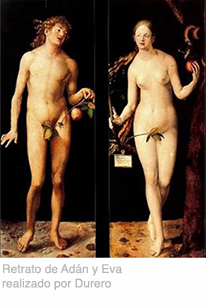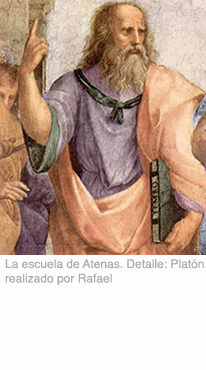On Utopia
© Eduardo Ruigómez

 The concept of Utopia has gone long across history. Maybe it started with Adam and Eve in their undercover run, way from God, looking for a better future. From this viewpoint, the first men on earth broke the rules of earthly paradise. They thought that something better was waiting for them on the other side, where the unknown is so tempting that it’s worth stepping forward in search of the realization of new scenarios, freshness and adventures to discover. The first couple in the planet, determined to explore beyond, started off the journey of mankind.
The concept of Utopia has gone long across history. Maybe it started with Adam and Eve in their undercover run, way from God, looking for a better future. From this viewpoint, the first men on earth broke the rules of earthly paradise. They thought that something better was waiting for them on the other side, where the unknown is so tempting that it’s worth stepping forward in search of the realization of new scenarios, freshness and adventures to discover. The first couple in the planet, determined to explore beyond, started off the journey of mankind.
This historic journey has arrived to current times loaded with tons of projects, aspirations and thrilling dreams. The last proposal was sold by Donald Trump, the arrogant brand new president of the USA. In a parallel exercise to the done done by Adam and Eve, Trump, breaks, in his very first steps, a space that was balanced until now, with its issues and benefits. The world shakes and look at the rear-view window. Then, the nostalgia appears.
Me parece interesante aportar un colofón al trabajo con unos pocas citas de escritores que han dedicado atención a la utopía:

 History of Utopia
History of Utopia
© Jean Servier
"Plato acknowledges the wish of growth of the cities driven by an eagerness of robbery or by a will of satisfaction of the ever-growing needs of their members. But old cities don’t feel in charge of fulfilling a divine promise or any sort of mission…"
"Utopia is the reaction of a social class. The shooting vision of a planned future which shows, through classic symbols of dreams, its deep wish of re-encountering the rigid structures of a traditional city..."
"Utopia is like a dream that reliefs its Weltschmerz, its world pain, living pain, always in the same fashion, with very little variations on subjects and ways of expression at any point of history. Above all, it’s the will of getting back to firm structures of a traditional city where they intend to be the enlightened masters, a city that raises above the troubled waters of dreams like an island in the ocean limits, like the City of Man, free from their anguish at the end of the night..."
"When approaching the shores of the New World, Christopher Columbus was certain that he was touching the Promised Land in the Old Testament, near the Earthly Paradise. He was so very certain that he chose Rodrigo de Jerez as his companion, a convert Jewish who spoke Hebrew and Aramaic, the languages that the inhabitants of the Promised Land, the revisited Eden should speak."Quotes taken from the book History of Utopia, by Jean Servier.


500 years of “Utopia’
© Francisco Martínez MesaMesa is a Teacher of Politics at the Complutense University of Madrid.
"¿What’s the difference between our miserable fellow citizens and the happy citizens of Utopia?, Moro wonders. Is it the lack of private property? The equality and tolerance atmosphere? The truth is that nothing, as simple and – at the same time – as complex as their own lifes ruling and the maintenance of their capability to be a part of and adapt reality to their real needs. Because, differently from many other savage people from wild lands, the Utopians do not leave isolated from the world. They receive the news of the illnesses of civilized Europe but they don’t want to suffer the same fate. And, if in order to get that they need to break the isthmus that linked them to the mainland, no doubt they will..."
"Moro does not show us, thus, a pleasant image of reality. On the contrary, he uses a critical tradition to dismantle the pieces that integrate society and, from there, he diagnoses the maladies it suffers from without making distintions between executioners and victims. His inscription on the here and now is total, very far from the idealized image that has been attempted to give. From his story, then, the author invites us to think about the possible causes of our mutual miseries, specially insisting on the universatily of suffering: some will die rich and some will die needy, by neither of them will die in peace."Quotes taken from an article published in El País in May, 14th, 2016.
History of Utopies
© Lewis Mumford
"During a long time, Utopia has been a way lo name the unreal and impossible. We tend to face the utopia against the world when, actually, utopias make the world tolerable: the cities and mansions which people dream of are the ones they finally inhabit."
"The world of ideas serves different purposes. Two of them are specially important in our research on Utopia. On the one hand, the pseudoenvironment or idolum subtitutes the external world: some kind of house or shelter where we run away when our crashes against <<harsh reality >> become too complex to endure or too hard to face. On the other hand, through the <<idolum>>s the facts of the daily world, all compressed, classified and filtered, form a new sort of reality that casts against the external world. One of their roles is the runaway or the compensation: the search for an immediate release from any difficulties or frustrations we have accrued to. The other role is to try to set up our future release conditions. I’ll name the utopies related to those two roles runaway utopias and rebuilding utopias, correspondingly. The first one lets the world remain as it is; the second one tries to change it in a way that we can interact with it on our own terms. In one of the cases, we build impossible castles in the air; in the other, we consult a surveyor, an architect and a builder and then proceed into the building of a house that will satisfy our basic needs to the point – of course – in which the houses built with stone and mortar can actually do that.
Quotes taken from the book Histories of Utopias, by Lewis Mumford
Utopia
© Alicia Almárcegui
"The 20th century is the Utopias century. Hitler’s National Socialism, Zionism, Real Socialism, Fundamentalism, extreme nationalism, left-wing and right-wing dictatorships, certain sects, and so on, are examples of disastrous Utopias. When the reality of Human Nature and things crashes with the things, it’s worse for reality”. This is the unavoidable rule and there exists an urge for exclusion for race, social class, religion, sex, nation reasons, among others. Maybe this is why certain Utopias live for a very short period of time."Quote taken from an article published in fronterad

